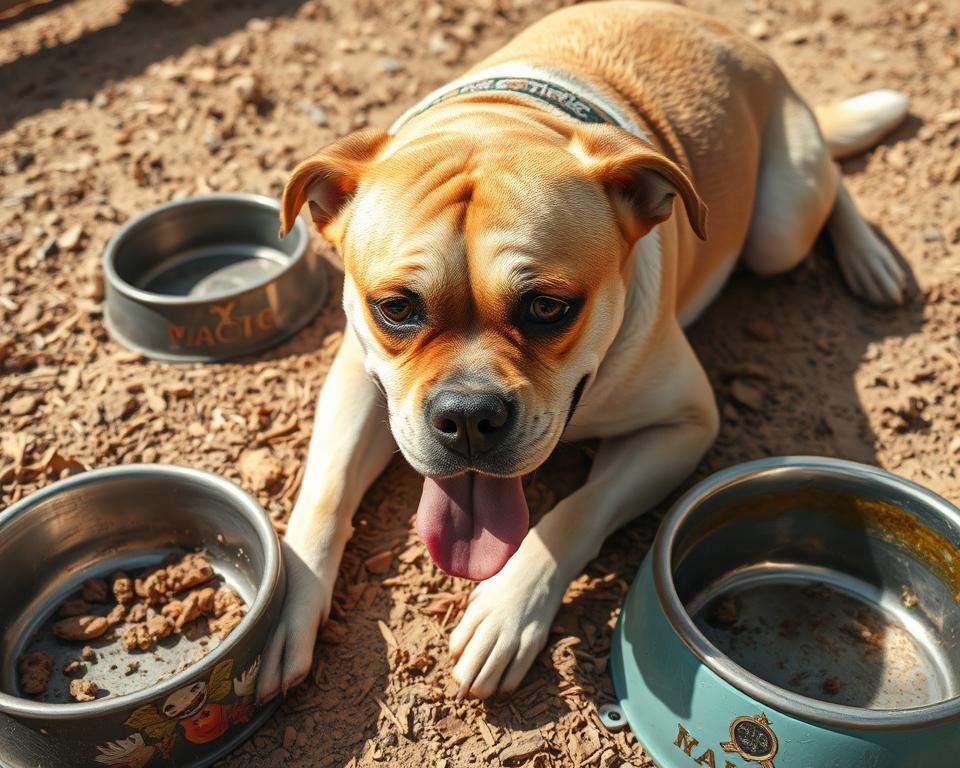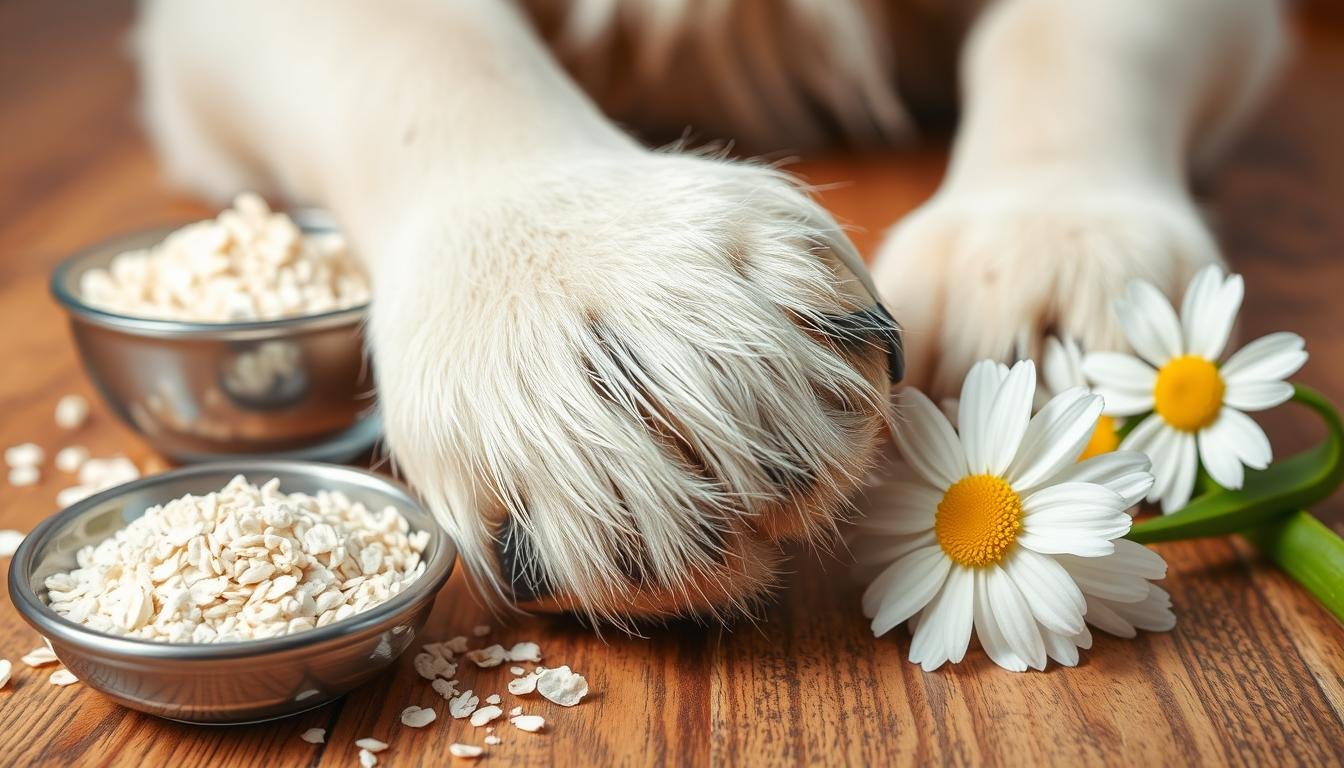Water is vital for dogs, with an average adult needing it every 24 hours. Without water, a dog’s health can quickly decline. This can lead to serious issues like kidney failure, coma, and even death. This guide will help you understand why water is so important for dogs, how to spot dehydration, and when to get vet help.
Dehydration can severely harm a dog’s health, affecting all bodily systems. Giving a dog water only once every few days is considered animal abuse. If a dog stops eating or drinking, it’s a sign of dehydration and needs vet care fast.
It’s key for dog owners to know the signs of dehydration. Look for signs like dry skin, gums, and eyes, dark urine, thirst, vomiting, and weakness. By knowing the risks of dehydration, you can keep your dog healthy and well-hydrated.
Understanding Water’s Vital Role in Canine Health
Water is key for a dog’s health, making up over 70% of their body. It’s vital for keeping organs working right, controlling body temperature, and keeping dogs healthy.
Why Dogs Need Regular Water Access
Dogs need constant access to fresh water for their daily needs. They lose water through breathing, going to the bathroom, and more. Having enough water is important to keep them from getting dehydrated and to keep them healthy.
The Link Between Hydration and Organ Function
Hydration is essential for a dog’s organs to work well. Water helps move nutrients, gets rid of waste, and keeps the blood flowing. Without enough water, organs can get stressed, the immune system weakens, and serious health issues can arise.
Water Requirements Based on Dog Size
The water a dog needs daily depends on their size and how active they are. Generally, dogs need about one ounce of water for every pound of body weight each day. Small dogs, like Chihuahuas and Dachshunds, need 120-240 ml of water for every 2.5 kg. Medium dogs, such as Labradors and Beagles, need 240-360 ml for every 5 kg. Big dogs, like Golden Retrievers and German Shepherds, need 360-600 ml for every 5 kg.
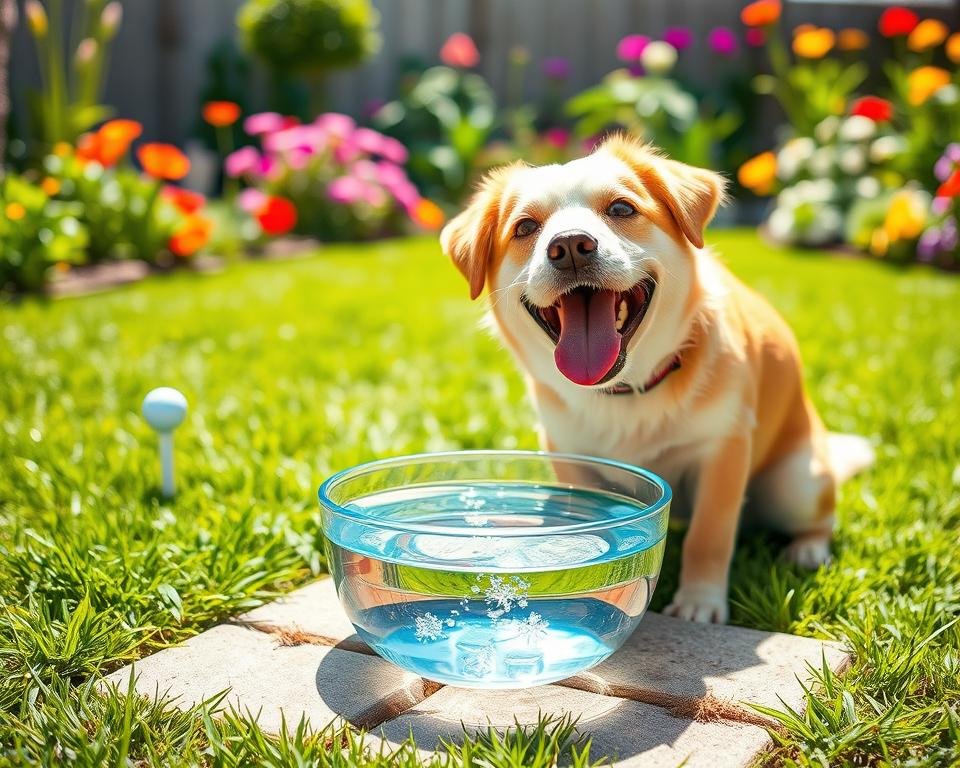
“Providing fresh, clean, clear drinking water daily is essential for maintaining the health and well-being of our canine companions.”
How Long Can a Dog Go Without Water
Dogs can survive 48-72 hours without water, but this is very dangerous. It’s considered animal abuse. Healthy adult dogs should have water for 24 hours at most. Puppies, older dogs, and those with health issues need water more often.
Going without water for too long can cause severe dehydration. This can even lead to organ failure in dogs. Dog water deprivation is a big concern because water makes up over 70% of a dog’s body. Dogs need about one ounce of water per pound of body weight each day.
- A 25-pound dog needs 25 oz. (or 3 cups) of water daily.
- A 75-pound dog needs nearly 2 liters of water daily.
Normally, a dog can go 6-10 hours without water. But, the canine dehydration timeline changes based on age, size, health, activity, and environment.
“A dog can go 6 – 10 hours without water under normal conditions.”
While dogs can survive 72 hours without water, dehydration starts after 24 hours. It’s very important for pet owners to make sure their dogs always have clean, fresh water.
Signs and Symptoms of Dehydration in Dogs
It’s important to know the signs of dehydration in dogs. Dehydration happens when a dog loses more fluids than it takes in. This can be serious if not treated quickly. Watching for physical and behavioral changes can help prevent problems.
Physical Symptoms to Watch For
One key sign is when a dog’s skin doesn’t snap back after pinching. This is a sign of dehydration. Other signs include:
- Dry, sticky gums
- Sunken, dry-looking eyes
- Dark, concentrated urine
- Lethargy and decreased energy levels
Behavioral Changes During Dehydration
Dehydration can also change how a dog acts. They might:
- Lose their appetite
- Drink less water and pee less
- Pant a lot or drool more
Emergency Warning Signs
If your dog shows severe dehydration signs, like vomiting, diarrhea, weakness, or collapse, get vet help fast. These are emergencies that need quick treatment to avoid serious harm.
Knowing the signs of dehydration helps keep dogs healthy. Catching it early and acting fast is key to avoiding bigger problems.
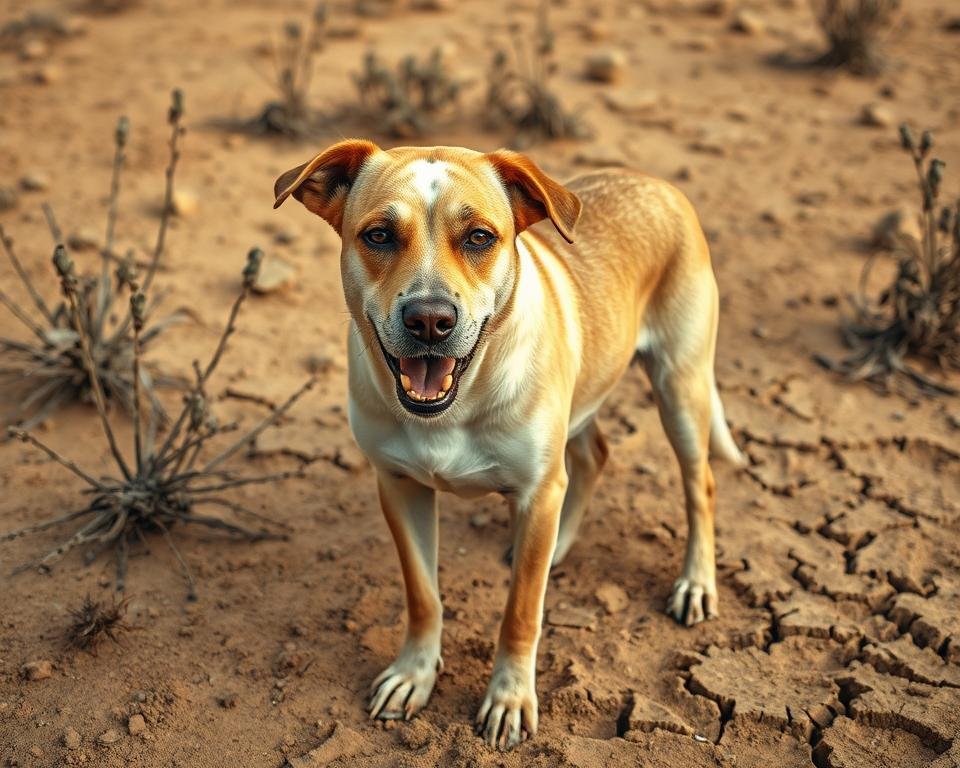
Daily Water Requirements for Dogs
Keeping your dog hydrated is key for their health. An adult dog needs about 1 ounce of water for every pound of body weight each day. So, a 25-pound dog needs about 25 ounces (3 cups) of water. A 75-pound dog needs almost 2 liters.
But, a dog’s water needs can change based on several things. Their activity level, diet, and where they live can all play a part. Dogs that are more active or live in hot places might need more water. Dogs eating wet food might need a bit less because they get moisture from their food.
| Dog Weight | Daily Water Requirement |
|---|---|
| 25 lbs | 25 oz (3 cups) |
| 50 lbs | 50 oz (6 cups) |
| 75 lbs | 75 oz (~ 2 liters) |
Watching how much water your dog drinks is important. Make sure they always have clean, fresh water. Age and health can also affect how much water a dog needs. Always talk to your vet for advice on your dog’s water needs.
“A healthy dog should drink around 1 ounce of water per pound of body weight daily.”
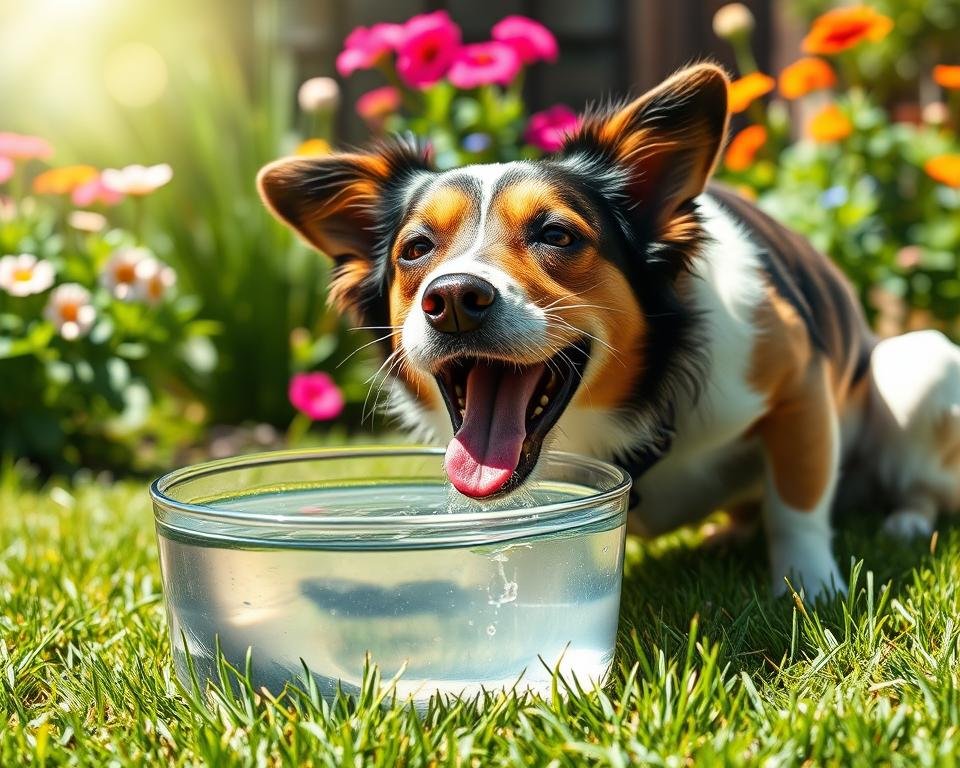
Common Causes of Water Refusal in Dogs
Dogs may not want to drink water for many reasons. These include medical issues, environmental changes, and behavior. Knowing why a dog won’t drink water is key to keeping them healthy and hydrated.
Medical Conditions Affecting Water Intake
Some health problems can make dogs drink less water. Issues like diabetes, kidney disease, and dental problems can cause this. Even infections and lactose intolerance can make dogs less thirsty.
Environmental and Behavioral Factors
Changes in a dog’s environment can also affect their water intake. Dogs might not want to drink water in new places. Also, switching to wet dog food can make them less thirsty, as it has more moisture.
When to Be Concerned
If a dog doesn’t drink water for over 24 hours, it’s a sign of trouble. Look for signs of dehydration like lethargy and dry gums. If you see these, get veterinary help fast.
To get a dog to drink more, make sure they always have fresh water. Clean their water bowls often and try different types. You can also add flavor to the water. If these steps don’t work, see a vet to check for health or environmental issues.
Preventing Dehydration in Different Situations
Keeping your dog hydrated is key to their health, no matter where you are. Knowing how to prevent dehydration in dogs helps keep them happy and healthy.
Make sure your dog always has access to clean water. Place water bowls in your home and yard. Check and refill them often, more so when it’s hot or your dog is active.
Think about getting a dog drinking fountain. It keeps water fresh and moving, making it more appealing to your pet.
- When traveling, bring a portable water bowl and bottles. Give your dog water often, even at rest stops.
- If your dog is sick or recovering, watch their water intake closely. Talk to your vet for advice on keeping them hydrated.
- Adding foods like pumpkin, blueberries, or mango to their diet can help them drink more water.
By being attentive and providing the right resources, you can keep your dog hydrated in any situation. This ensures their health and happiness.
| Dog Weight | Daily Water Requirement |
|---|---|
| 25 lbs | 25 oz (3 cups) |
| 75 lbs | 1.9 liters (2 quarts) |
“Staying hydrated is just as important for dogs as it is for humans. By making water readily available and encouraging regular drinking, you can help prevent dehydration and its associated health risks.”
A healthy dog can usually go 6-10 hours without water. But, it’s best to always have clean, fresh water available for their well-being.
When to Seek Veterinary Care
Keeping your dog hydrated is key to their health. If your dog shows severe dehydration signs or won’t drink water for over a day, get veterinary care fast. Ignoring these signs can be deadly, so act quickly.
Emergency Situations
If your dog keeps vomiting, has diarrhea, or seems very tired, it’s an emergency. Get vet help right away. These signs can mean a serious problem that needs quick treatment.
Treatment Options for Dehydration
Vets might give your dog IV fluids to quickly rehydrate them. They might also give meds for any health issues causing dehydration. This could be infections or stomach problems.
Recovery Timeline
How long a dehydrated dog takes to recover depends on how bad it is and any other health issues. Mild cases might recover in a few days. But severe cases could take a week or more to fully recover.
It’s up to dog owners to watch for signs of dehydration and get veterinary care for dogs if needed. Early action can prevent serious problems and keep your dog healthy for a long time.
Conclusion
Keeping your dog hydrated is key to their health. Make sure they always have access to clean water. Watch for signs of dehydration and get vet help when needed.
Knowing your dog’s dog water safety needs is important. Being alert helps keep them happy and healthy for a long time.
Dogs can get dehydrated fast, which can be very serious. Always check if they’re drinking enough water. If you see any bad signs, get them to the vet right away.
Having clean, fresh water is a must for your dog’s health. By focusing on their hydration, you help them stay healthy and happy for many years.
FAQ
How long can a dog go without water?
Healthy adult dogs should not go more than 24 hours without water. Dogs can survive 48-72 hours without water, but this is very dangerous and considered animal abuse.
What are the signs and symptoms of dehydration in dogs?
Dehydration in dogs shows as loss of skin elasticity and dry, sticky gums. They may also have sunken eyes, lethargy, and excessive panting. Dark urine is another sign.
Behavioral changes include loss of appetite and less urination. Look out for severe weakness, vomiting, diarrhea, and collapse as emergency signs.How much water does a dog need daily?
An average adult dog needs one ounce of water for each pound of body weight daily. For example, a 25-pound dog needs about 25 ounces (3 cups) of water. A 75-pound dog requires nearly 2 liters.
Why might a dog refuse to drink water?
Dogs may not drink water for many reasons. These include pain, fever, infections, dental issues, or neurological problems. Stress or changes in routine can also affect their water intake.
When should I seek veterinary care for my dog’s dehydration?
Seek immediate veterinary care if your dog shows severe dehydration symptoms or refuses water for more than 24 hours. Look for signs like persistent vomiting, diarrhea, or lethargy as emergencies.

